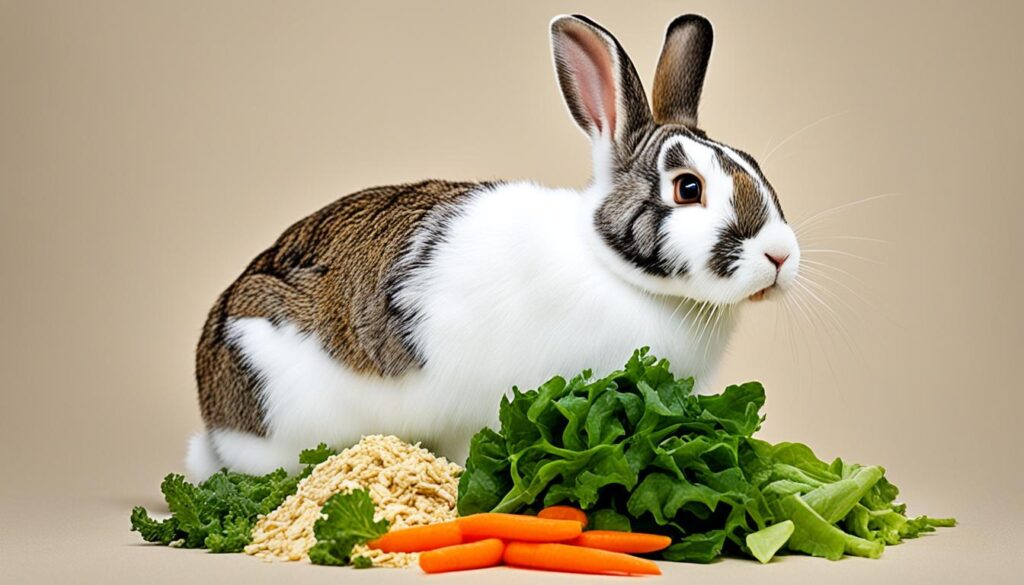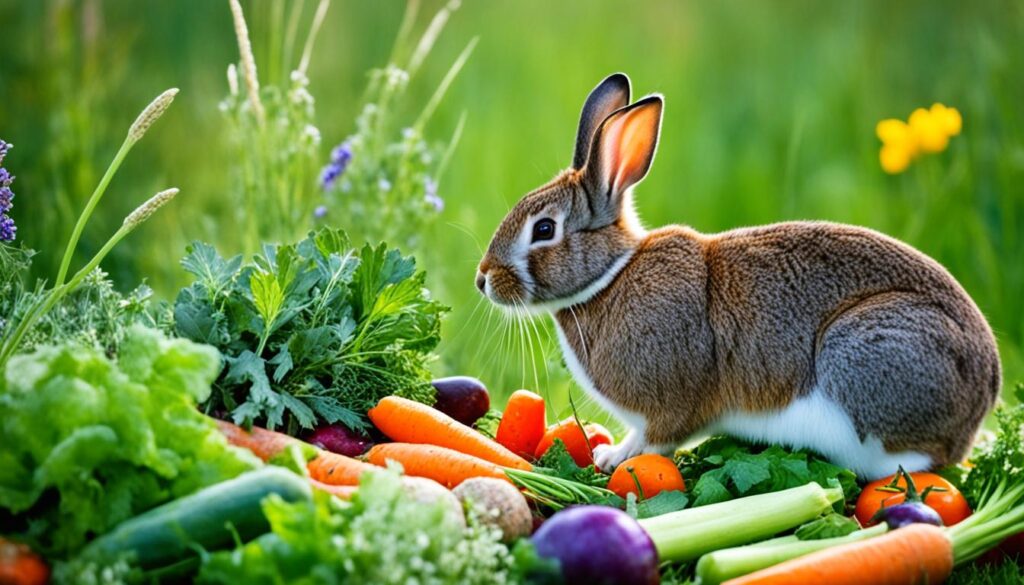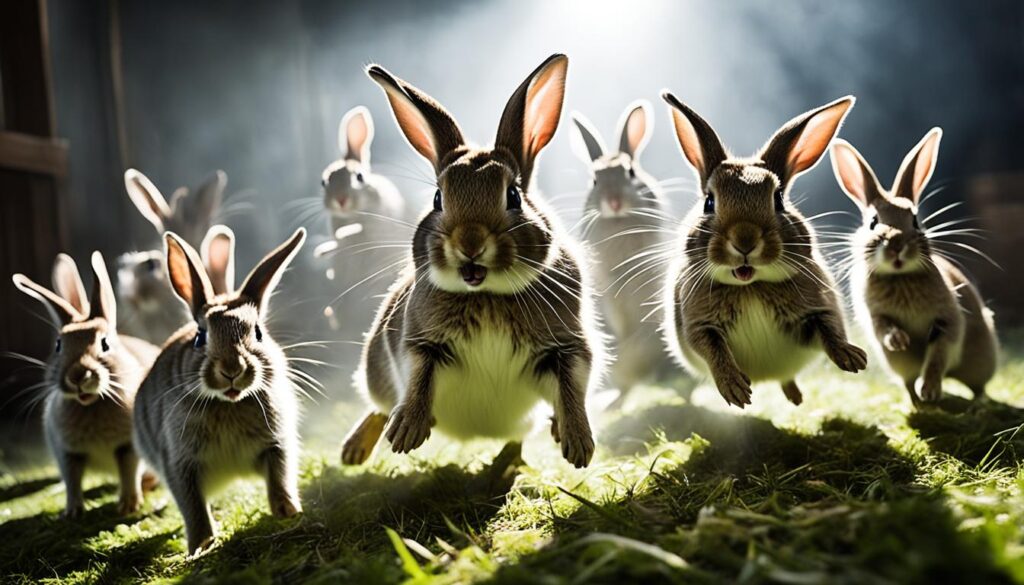About 30% of pet rabbits show a strong urge to chase rodents, says a study from the University of California. This fact makes us wonder: do these herbivores actually eat mice and other small rodents? The truth might surprise you.

Rabbits are mostly plant-eaters but can sometimes eat other animals if they need to. In the wild, they might eat rats when they can’t find enough plants to eat. Rats are full of protein, which is great for rabbits.
Key Takeaways
- About 30% of pet rabbits show a strong urge to chase rodents.
- Rabbits may eat rats when they can’t find enough plants to eat.
- Rats are full of protein, vitamins, and minerals important for rabbits.
- But, rabbits need a balanced diet with veggies, hay, and pellets.
- Eating rats can make rabbits sick and give them parasites, so it’s risky.
Wild Rabbits and Their Dietary Habits
Rabbits mainly eat plants like grass, leaves, and veggies. They need to eat 65-80 grams of food per kilogram of their body weight. For example, a 1.0-1.5kg rabbit eats about 65-120g of food daily. A single strawberry is like a sixth of what they need each day.
Rabbits Are Herbivores By Nature
Wild European rabbits eat around 65.7-68.3 grams of food per kilogram of their weight. Cottontails in the Americas also need similar amounts of food. Safe foods for them include carrot tops, apple peels, and herb stems. But, they should avoid potato, onion, garlic, corn, beans, nuts, and avocado. In winter, they can eat hay or dried grass when food is hard to find.
Wild Rabbits May Eat Rats For Nutrients
Sometimes, wild rabbits eat small animals like rats when they can’t find enough plants. This is rare but helps them get important nutrients they can’t get from plants alone.
Rabbits Eat Carrion In The Wild
Rabbits also eat dead animals, or carrion, to get nutrients and avoid fighting over food. This shows how adaptable and resourceful wild rabbits are in finding food.

Pet Rabbit Attacks On Mice
It’s not often, but pet rabbits can sometimes attack smaller rodents like mice. This can be due to their prey drive and territorial instincts. About 30% of pet rabbits show a strong prey drive towards smaller animals. They might act defensive if they see mice as a threat to their space. It’s key to manage these behaviors and keep your rabbit’s area free of rodents.
Prey Drive In Pet Rabbits
Rabbits are naturally cautious of predators like dogs and cats. How well rabbits live with other animals depends on the animals themselves. Some dogs, like Australian shepherds, border collies, and beagles, chase and might attack rabbits. Training these dogs is important to control their prey drive around rabbits.
Territorial Behavior Towards Rodents
Cats often hunt small animals, including rabbits, due to their hunting instincts. Their bites can be deadly to rabbits because of bacteria in their saliva that cause serious wounds and infections. Owners should create cat-proof areas to protect their rabbits from cats.

It’s crucial to know that pet rabbits might act aggressively towards smaller rodents like mice. Understanding their prey drive and territorial behavior helps pet owners keep their rabbits safe and happy.
Do Rabbits Eat Mice?
Rabbits mainly eat plants, grasses, and veggies. But, they might eat mice sometimes, especially in the wild where food is hard to find or when they feel threatened.
Rabbits aren’t meant to eat meat like mice. Their bodies aren’t made for the high protein and fat in rodents. Eating mice can make rabbits sick, causing stomach problems.
Rabbits should eat hay, pellets, and fresh greens for their health. Don’t give them meat or mice to eat. This keeps them healthy and happy.
| Prey | Consumption Rate |
|---|---|
| Garter snakes | Up to 85% of stomach samples contain mice |
| Barn owls | Over 1,000 mice consumed during a breeding season |
| Great horned owls | Over 500 mice consumed by a single family in a season |
| Long-tailed weasels | Up to 10 mice consumed per day, amounting to 10,000 mice killed annually |
| Least weasels | 30-50 mice consumed annually, comprising up to 60% of their diet |
| Mountain lions | Mice identified in over 25% of scat samples from coastal California |
These examples show how mice are eaten by many predators. But, rabbits aren’t built to eat mice safely. Giving rabbits a plant-based diet is best for their health.
Nutritional Value Of Mice For Rabbits
Rabbits are mainly plant-eaters and don’t usually eat mice in the wild. Sometimes, they might eat things they shouldn’t, like mice, because they are bored or stressed. This can make them very sick.
High Protein And Fat
Mice can give rabbits protein and fat, which they need to stay healthy. But, eating too much of these can make rabbits sick. They might have stomach problems or a weak immune system.
Vitamins And Minerals In Mice
Mice have vitamins and minerals like vitamin B12 and iron that are good for rabbits. But, rabbits should mainly eat foods like hay, fresh grass, and veggies. This keeps them healthy.
The Dangers Of Eating Rodents
Eating mice can be dangerous for rabbits. They can get sick from diseases or parasites from rodents. Mice might also be poisonous to rabbits.
Pet owners need to know the risks of rabbits eating mice. They should feed their rabbits the right foods to keep them healthy. Giving them lots of hay, veggies, fruits, and special rabbit food helps. Toys and a fun living space can also stop them from eating things they shouldn’t.
| Nutrient | Mice | Rabbits |
|---|---|---|
| Protein | Approximately 14-16% | Require a balanced diet with high-quality protein sources |
| Fat | Approximately 5% | A diet too high in fat can lead to health issues |
| Vitamins and Minerals | Contain beneficial vitamins and minerals, such as vitamin B12 and iron | Require a varied diet to meet their specific nutritional needs |
| Health Risks | Potential for transmitting diseases or parasites | Consuming mice can lead to digestive issues and other health problems |
Preventing Your Rabbit From Eating Mice
To keep your rabbit safe, it’s important to take steps ahead of time. Make sure their home is secure, watch them when they play outside, and feed them well. These actions help stop your rabbit from eating mice.
Choose Appropriate Housing
Rabbits can fit into small spaces, so their home must be strong and well-made to keep out mice. Check their home often and fix any holes or gaps with safe sealants or mesh. This stops mice from getting in.
Supervise Outdoor Play Time
When your rabbit goes outside, watch them closely. Keep their play area clean and free of mouse droppings or nests. This keeps mice away and lowers the chance of your rabbit meeting mice.
Feed A Healthy Diet
Feeding your rabbit well can stop them from looking for other food, like mice. Give them lots of good hay, fresh veggies, and a little bit of special pellets. This diet helps them not want to eat mice.
By doing these things, you can stop your rabbit from being interested in mice. This keeps them safe and healthy.
Dietary Variety for Wild Rabbits
The wild rabbit diet is key to their health and survival. These animals eat a mix of grasses, clovers, dandelions, flowers, roots, and sometimes fruits and seeds. Feeding wild rabbits a variety of plants helps them get the vitamins, minerals, and nutrients they need to stay healthy. Without a varied diet, they might get sick or become malnourished.
The importance of dietary variety for rabbits is huge. Their diet changes with the seasons. In spring and summer, they eat flowers and veggies. In fall and winter, they eat woody plants like twigs and bark. This variety helps them get the nutrients they need all year.
- Rabbits eat a wide variety of plants, including grass, weeds, seeds, flowers, and leaves.
- Rabbits leave behind small, pellet-shaped waste wherever they eat.
- Rabbits leave ¼ to ⅜ incisor gnaw marks on older woody growths, especially in winter, and nip stems at a clean, 45-degree angle.
To provide a diverse food source for wild rabbits, we should keep their habitat full of different plants. This means using smart landscaping with a mix of grasses, shrubs, and flowers. By doing this, we help wild rabbits stay healthy and happy.
| Dietary Requirement | Percentage of Diet |
|---|---|
| Hay or Grass | Around 80% |
| Rabbit Nuggets | Carefully Measured Portion |
| Crude Fiber | Around 25% |
Understanding the wild rabbit diet and the importance of dietary variety for rabbits helps us support these amazing animals. It ensures they get the diverse food they need to live well.
Conclusion
Rabbits are mostly plant-eaters but can eat rodents like mice if they get the chance. This is more common in wild rabbits where food is hard to find. For pet rabbits, eating mice might be because they have an instinct to hunt or protect their territory.
It’s key to keep your rabbit safe from mice and feed them a healthy diet to stop them from looking for other food.
Learning about what wild and pet rabbits eat helps us care for them better. It’s important to know the truth about rabbit diets for good pet care. Vets say a steady, balanced diet is key for rabbits’ health.
Looking after pets means thinking about their body, mind, and feelings.
Rabbits, whether in the wild or as pets, can eat rodents sometimes. By knowing this and giving them a safe, interesting home, we help them stay healthy and happy.
Related Read More: CAN RABBITS EAT POPCORN? A GUIDE FOR PET OWNERS
FAQ
Do rabbits eat mice?
Rabbits are mostly plant-eaters but might eat small animals like mice if they can. This is more common in wild rabbits where food is hard to find.
What are the natural dietary habits of wild rabbits?
Wild rabbits eat mostly plants like grass and leaves. They might also eat small animals, including rats, when food is scarce. They can also eat dead animals to get nutrients and reduce competition for food.
Can pet rabbits attack mice?
Some pet rabbits might attack mice. This can happen because they like to chase and because they feel protective of their space. About 30% of pet rabbits show a strong chase instinct towards small animals.
What is the nutritional value of mice for rabbits?
Mice can give rabbits protein and fat, which are important for their health. They also have vitamins and minerals like vitamin B12 and iron. But, eating too much protein and fat can be bad for rabbits. Also, they might get diseases or parasites from rodents.
How can I prevent my pet rabbit from eating mice?
Keep your rabbit’s home rat-proof and check for any holes. Watch them when they’re outside to keep away rodents. Give them a good diet of hay, veggies, and a little bit of pellets to keep them healthy and less likely to eat mice.
Why is dietary variety important for wild rabbits?
Wild rabbits need to eat different plants to stay healthy. They eat grasses, clovers, and many other plants. Eating a variety of foods helps them get all the vitamins and nutrients they need. Without different foods, they could get sick.